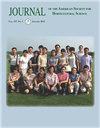转录组分析揭示葡萄施用微生物肥料后花序伸长的分子机制
IF 1.1
4区 农林科学
Q3 HORTICULTURE
Journal of the American Society for Horticultural Science
Pub Date : 2023-07-01
DOI:10.21273/jashs05271-22
引用次数: 0
摘要
微生物肥料可以激活和促进养分吸收,帮助花序伸长。为了了解微生物施肥后葡萄(Vitis vinifera)花序伸长的分子机制,我们综合分析了“夏黑”葡萄花序在不同叶期的转录组动力学。随着“夏黑”葡萄花序的发育,赤霉素含量逐渐增加,微生物肥料组的赤霉素含量明显高于相应的对照组。此外,微生物肥料组和对照组在4、6、8、10和12叶期分别有291、487、490、287和323个差异表达基因。京都基因和基因组百科全书通路注释显示,大多数上调的DEG在6、8和10叶期的淀粉和蔗糖代谢通路中富集。加权基因共表达网络分析确定了大多数DEG的阶段特异性表达。此外,在不同的叶期发现了多种转录因子和植物激素信号传导相关基因,包括碱性螺旋-环-螺旋蛋白、CCCH锌指蛋白、赤霉素受体GID1A、2-糖基水解酶家族16、蛋白TIFY、MYB转录因子、WRKY转录因子和乙烯反应因子,表明许多转录因子在不同发育阶段的花序伸长中起着重要作用。这些结果为不同叶期花序伸长的动态转录组学变化提供了有价值的见解。本文章由计算机程序翻译,如有差异,请以英文原文为准。
Transcriptome Analysis Reveals the Molecular Mechanism of Grape Inflorescence Elongation after Applying Microbial Fertilizers
Microbial fertilizers can activate and promote nutrient absorption and help inflorescence elongation. To understand the molecular mechanisms governing grape (Vitis vinifera) inflorescence elongation after microbial fertilizer application, we comprehensively analyzed the transcriptome dynamics of ‘Summer Black’ grape inflorescence at different leaf stages. With the development of ‘Summer Black’ grape inflorescence, gibberellic acid content gradually increased and was clearly higher in the microbial fertilizer group than in the corresponding control group. In addition, the microbial fertilizer and control groups had 291, 487, 490, 287, and 323 differentially expressed genes (DEGs) at the 4-, 6-, 8-, 10-, and 12-leaf stages, respectively. Kyoto Encyclopedia of Genes and Genomes pathway annotation revealed that most upregulated DEGs were enriched in starch and sucrose metabolism pathways at the 6-, 8-, and 10-leaf stages. Weighted gene coexpression network analysis identified stage-specific expression of most DEGs. In addition, multiple transcription factors and phytohormone signaling-related genes were found at different leaf stages, including basic helix-loop-helix proteins, CCCH zinc finger proteins, gibberellin receptor GID1A, 2-glycosyl hydrolases family 16, protein TIFY, MYB transcription factors, WRKY transcription factors, and ethylene response factor, suggesting that many transcription factors play important roles in inflorescence elongation at different developmental stages. These results provide valuable insights into the dynamic transcriptomic changes of inflorescence elongation at different leaf stages.
求助全文
通过发布文献求助,成功后即可免费获取论文全文。
去求助
来源期刊
CiteScore
3.80
自引率
0.00%
发文量
31
审稿时长
2 months
期刊介绍:
The Journal of the American Society for Horticultural Science publishes papers on the results of original research on horticultural plants and their products or directly related research areas. Its prime function is to communicate mission-oriented, fundamental research to other researchers.
The journal includes detailed reports of original research results on various aspects of horticultural science and directly related subjects such as:
- Biotechnology
- Developmental Physiology
- Environmental Stress Physiology
- Genetics and Breeding
- Photosynthesis, Sources-Sink Physiology
- Postharvest Biology
- Seed Physiology
- Postharvest Biology
- Seed Physiology
- Soil-Plant-Water Relationships
- Statistics

 求助内容:
求助内容: 应助结果提醒方式:
应助结果提醒方式:


